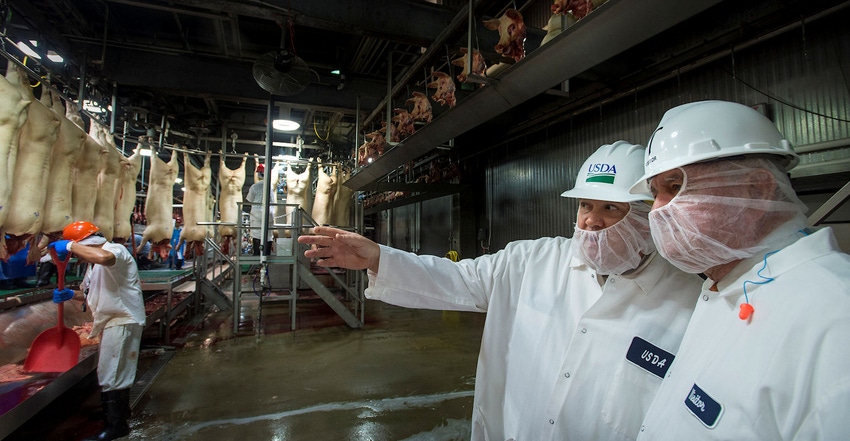One of three ongoing challenges to USDA’s New Swine Inspection System advances in Californian district court.

In a ruling Feb. 4, a federal court in the United States District Court of Northern District of California allowed a lawsuit contesting the Trump administration’s update on swine slaughter line inspections to proceed. The court denied the government’s motion to dismiss the case, saying that the groups had the legal standing to pursue their claims.
USDA’s Food Safety and Inspection Service’s New Swine Inspection System was enacted into law in the fall of 2019. The voluntary program increases efficiency and effectiveness of the federal inspection process, allows for the rapid adoption of new food-safety technologies in pork slaughter, and has the potential to increase U.S. harvest capacity.
NSIS, which has been piloted at five pork processing plants, was developed over many years of research and evaluation and received the endorsement of the National Association of Federal Veterinarians, highlighting the strong science-based approach used in designing the program.
The plaintiffs —Food & Water Watch, Center for Food Safety and Humane Farming Association—filed their lawsuit in early 2020 challenging USDA’s NSIS program. The organizations assert that the Trump administration�’s rules will harm consumers by eliminating statutory requirements that federal government inspectors perform critical inspection responsibilities, instead handing these over to slaughter plant employees. The lawsuit also challenged the rules’ lifting of limits on plants’ slaughter line speed.
Plaintiffs allege that the final rule’s adoption of the NSIS marks a “radical transformation” of the federal government’s inspection of swine and swine carcasses, according to the court filing. The prior inspection scheme required federal government inspectors to inspect swine before slaughter, tagging and separating animals indicating signs of disease from other animals. After slaughter, federal inspectors appraised the carcass of each animal, condemned animals found to be adulterated, and supervised the disposal of the condemned animals to ensure they did not enter the food supply.
They allege that under the final rule, plant employees are not required to receive inspection training, “which will increase the amount of adulterated or contaminated swine products entering the food market and will increase the risk of foodborne illness and increased prices.” They also claim the calls for increased line speeds will “diminish the ability of inspectors to identify potentially diseased and adulterated carcasses.”
The court ruled that “[a]ccepting [their] allegations as true, the Court concludes there is a credible threat that [their] members face an increased risk of illness from consuming adulterated pork products because of the [new rules], sufficiently establishing standing based on potential future harm.”
In response, Zach Corrigan, senior staff attorney at Food & Water Watch, says, “We hope that this sends a signal to the Biden administration that it needs to go back to the drawing board and ensure policies that will prioritize public health and safety over corporate profits.”
The suit is one of three that have been lodged around the country challenging the legality of the swine slaughter rules.
The United Food and Commercial Workers International Union together with Public Citizen and UFCW Locals 663, 440 and 2 filed a federal lawsuit in the United States District Court for the District of Minnesota seeking to stop the swine slaughter modernization rule. All of the UFCW locals who are parties in the lawsuit represent pork slaughter workers: UFCW Local 663 is based in Brooklyn Center, Minn.; UFCW Local 440 is based in Denison, Iowa; and UFCW Local 2 is based in Bel Aire, Kan. The National Pork Producers Council and the North American Meat Institute filed an amicus brief with this challenge supporting the rule.
NPPC says it strongly supports the NSIS and the program’s loss could result in an annual capacity reduction of nearly 2 million hogs. Using data from plants that were part of the pilot project, NAMI notes that line-speed increases have not correlated with increased injury rates. From fiscal years 2015 to 2016, for example, the average line-speed increased from 1,147 head-per-hour to 1,210 head-per-hour, while the incident rate for laceration and repetitive-motion injuries declined. Likewise, from fiscal years 2018 to 2019, the average line speed increased from 1,252 to 1,292, and the incident rate for laceration injuries declined.
The other is Farm Sanctuary’s case, in western New York where it is currently facing a USDA motion to dismiss. At 2 p.m. on Feb.11 in the Western District of New York, Federal Judge Elizabeth A. Wolford is going to hear oral arguments via “Zoom for Government” on USDA’s motion to dismiss a 2019 lawsuit filed by Farm Sanctuary challenging not only the line speed but the entire new rule modernizing swine slaughter.
About the Author(s)
You May Also Like



.png?width=300&auto=webp&quality=80&disable=upscale)

